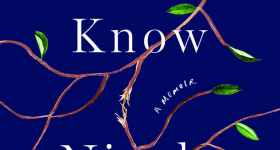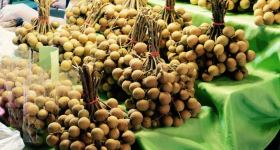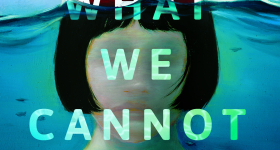When Laura Chow Reeve’s short story, “1,000-Year-Old Ghosts,” came through the slush last year, I knew immediately I had found something special. It is a beautiful story, about memories and language and culture and family, offered up with an unusual twist: the family pickles memories. I accepted the story a mere week after it was submitted and published it that June.
Since then, the story has gone on to win the 2017 PEN/Robert J. Dau Short Story Prize for Emerging Writers, has been anthologized in Catapult’s PEN America Best Debut Short Stories 2017 (just published on August 22, 2017), and was recently read by LeVar Burton on his podcast, LeVar Burton Reads.
Recently, I called Laura at her home in Florida from a small writing colony in upstate New York. The connection was crackly and Laura’s dog kept whining for attention, yet we had a great time talking about memory, personal history, “weirdness,” and pickling.
This interview has been edited for clarity and brevity.
—Karissa Chen, Senior Literature Editor
Karissa Chen: Let’s first talk about your story, "1,000-Year-Old Ghosts." What I love about it is that you took something as abstract as memory, with all the stuff that’s caught up in it—the pain of not forgetting but also of remembering—and turn it into something tangible, like pickling. Could you tell me a little bit about how you settled on pickling as a metaphor?
Laura Chow Reeve: I first wrote a version of the story when I was doing a "Fun-a-Day" project in Philly, so I wrote these really short stories every day and one was about this daughter coming home to her mom and finding these physical memories. She finds them underneath the doormat first and then she goes throughout the house and finds them. I think I settled on pickling because I just think pickling itself is a really interesting process. It preserves something but it also alters whatever’s being pickled. Memories are constantly evolving and changing, and everyone’s memories of one thing can be completely different. So I thought pickling was a really interesting way of talking about that and the weird process of how we remember physically.
KC: Well, it’s interesting, too, because it kind of does this dual thing—it’s acting as a metaphor but, also, if we think about what we inherit from our grandmothers, aside from the stories they tell us (or don't), it’s oftentimes a craft. Like how I learned to make dumplings from my mom; there are these physical things we do with the people we love, things they’re teaching us and passing down to us. It’s interesting that this grandmother is like, “I don’t want you to hold onto the burdens of anything, I’m not going to give you my memories—but let me teach you this other thing. I’m still passing this thing down to you.”
LCR: I also feel like food is a really interesting way that that happens. A craft or a recipe can be passed down, but so can habits. I think a lot about the habits I inherited from my mother that she probably never intended me to have. One really silly one I have is how I put up my parking brake even when the road is flat. That is one-hundred percent a habit I picked up from my mother because she does it. So even in those small moments, just by being around that person and those little things that they do, you start mimicking them. That’s mentioned in the story: the narrator even says, “Popo taught me never to make [pickling memories] a habit,” but she does because it’s a habit that her Popo had. It’s not just those memories or these intentional things that are passed down, but also these unintentional things that the people we love do, things that we start to do, too.
KC: I want to talk a little bit more about this memory stuff. You present this dichotomy where there are these people who just want to forget—that’s the grandma, who’s like, “I’m here now, these painful things are behind me, I don’t want to remember them. I’m not even going to teach my daughter Cantonese because I want her to just speak English,”—and there’s the grandma’s daughter, who says something like, “No, I want to remember everything,” and asks her mother, “Why do you get to choose what we get to remember?” I feel like those are two very common, different approaches when it comes to the immigrant experience. There’s this gap in knowledge and there are these experiences that you’re missing a crucial part of, especially if you’re a first-generation American. So I’m curious, in your life, how has that tension between forgetting and remembering played out?
LCR: I was thinking a lot about these refusals to pass on certain things, and language was the biggest thing for me. My grandparents didn’t teach my mother and my mother’s siblings Cantonese pretty purposefully as a way of assimilation—they thought they would be better off this way. They made this decision for them and then, obviously, [the language] never trickled down to me, other than a few words here and there. Growing up that way was always so frustrating to me. I’ve always wanted to know how to speak, and I think I was really thinking about why someone else gets to choose what I know and how I connect with people in my family? In the story, I think it’s just this one person who really holds the power of deciding, but I don’t think that’s how it works; I think that families kind of make these decisions together and probably not even consciously.
I have an uncle who is really invested in knowing our family’s history. It’s pretty interesting because I’m a later-generation Chinese American and a mixed-race Chinese American. My grandfather was born here in San Francisco, in Chinatown, and on my other side, my great-grandmother was born in Stockton. It’s not very common because, historically, with the Chinese Exclusion Act, these larger families weren’t happening, and there aren’t as many Chinese Americans with longer generational ties to the United States. But my uncle found all of these government documents of my great-grandfather applying to go back and forth [between the U.S. and China]—because my great-grandfather was actually a merchant. He gave me copies of them, and that obviously inspired "1,000-Year-Old Ghosts" even though the details are not super faithful to what actually happened.
I guess I’m just trying to think about the ways in which I’ve yearned for so much of my life to know more about my family and about that specific side to my family. As someone who is racialized and trying to navigate what that looks like without having these direct and concrete ties to the culture that people expect—one of those being language—it’s always been this desire, this constant yearning, that I hope people feel in the story, too. It’s also about the complexities of what that yearning looks like.
KC: Yeah, that yearning is often something that can’t be fulfilled because a lot of times we can’t know that full story. Even if you have the opportunity to ask your grandparents, like you said, they’re older, they may not be able to remember a lot of the details anymore or, for some people, you don’t think to ask until it’s too late. What I think is interesting about "1,000-Year-Old Ghosts" is that by making it physical, even though the grandmother is banishing these memories and putting them in jars, she holds onto them. In the story, unlike in real life, the narrator has an opportunity to smash open these jars and to reclaim the memories that she wasn’t given an opportunity to have. When I read that, I thought, "Man that’s really cathartic because we don’t have that chance in real life, but we wish we did. We wish it was as easy as finding that jar." Why do people hope to come across a diary that their grandmother kept or why do we go through Ancestry.com? It’s because people are looking for these artifacts, these physical remains of history that aren't available to them.
LCR: On the one hand, it’s exciting because you finally get to see what’s in the jar, but she’s also remembering that her mom and grandmother are gone. So it’s this really lonely moment of finding these things that maybe make you feel closer to [these people], but you can’t talk to them anymore. What she’s also yearning for is a way to connect with these women in her family, and it happens too late.
My grandfather recently passed, and we were going through his house and found all these pictures. It’s really amazing—how much we have, but also he’s not there for us to say, “Tell me more about this or this.” Or, recently, I was with my family and I learned for the first time that one of my great-aunts, one of my grandfather’s sisters, was a singer and a performer in a Chinatown nightclub. I’m super interested in this and am thinking about basing some of that for a novel project, but no one really knows anything more about it and I don’t know who to ask.
So that moment when she finally opens the jars, she’s like, "Now what?" Nothing’s fixed in that story. Now that she knows everything, she feels the same...but also overwhelmed.
KC: I want to pivot a little bit. I really like this story for its form and tone. It’s sort of magical realism and tackles questions that I think are really common within diasporic literature at an interesting angle.
LCR: So when I was working on my master’s thesis at UCLA, which was a collection of stories that this story was actually a part of, I was interested in magical realism, science fiction, and speculative fiction. I kind of told people I was really interested in “weirdness.” I would try to name that in a more articulate way, but it still became “weirdness” and queerness and trying to talk about things like memory that are abstract. As a queer person of color, I just don’t know of any other way to talk about the way I engage with the world than through alternative forms or alternative story structures or having something magical happen. It’s always been the kind of work I’ve been interested in both reading and writing.
Right now, I’m living in Florida, which I really love, but it’s also really hard. It’s a place that is often disavowed—it’s a place that people joke about cutting off from the rest of the United States, as if Florida is the only place where like white supremacy and homophobia and transphobia exist. And it’s also in the South—I’m living in northeast Florida, which is right near the Georgia border, so I’m living right near the Bible Belt. That’s really difficult, but the South has so much magic and resilience in it; folks of color and queer and trans folks of color have done so much work in living here and resisting these awful things that exist here and everywhere. And they often get left behind in many ways: LGBTQ organizations in the South get a dismal percentage of funds compared to anywhere else in the United States.
But Florida is also just weird in this really great way—there’s dinosaurs that live here, like alligators and manatees. It’s just bananas. The nature is out of this world. Sometimes you can go somewhere and it can feel prehistoric in this really amazing way. I’ve also just been writing a lot about Florida, writing a lot about how it feels to be here. One of my stories is really invested in how Florida feels haunted in these ways. So it’s not just about memories for me, but also about navigating living here. I’ve been using a lot of magical realism to talk about that in my fiction.
KC: Why don’t we talk a little bit about LeVar Burton reading "1,000-Year-Old Ghosts" on his podcast, LeVar Burton Reads. I imagine that was the first time you heard someone else read your story out loud like that, and obviously he was reading it in a way where he was interpreting what was on the page. I’m wondering if there was anything about the reading that was surprising to you or anything even in the conversation afterwards, when he talks a little bit about what resonated with him personally.
LCR: It was surreal. I’ve never heard someone read my work before, period. He did such an amazing job. There were parts when I didn’t remember what happened next, and he kind of made it new for me. I didn’t know that was possible because this story especially, of all my writing, I’ve read or heard so many times; I’ve thought about it and engaged with it often, especially after it got published in Hyphen and all of the subsequent things that happened. LeVar reading it felt like it was brand new to me. That was exciting and really weird. Also, I didn’t know I would love this because I’m still a pretty new writer in this way, but I love hearing people talk about my writing and how they interpret it and what it means to them. He was just so generous and tender in the way he was describing his relationship to that story and his personal connection. I loved it. And even if there weren’t things that I intended, they were interpreted differently [by readers], and I think that’s still one of my favorite parts. It rekindles my interest in the story, even if it’s one I wrote a long time ago.
KC: Obviously, the story resonates with me because I also have Chinese American family, so it’s very directly applicable to me. But listening to LeVar speak about your story really reminds me of the power of literature to reach many people. I think it's interesting because LeVar is a Black man from a different generation, and we get to hear how it resonates with him on a different level.
LCR: White folks often expect people of color to read all of their literature, and we're supposed to connect with it in an emotional way. And we do, but they think it’s impossible for someone else to connect with the specificity of like…well, like my story specifically—as a mixed-race Chinese American navigating these questions of immigration and diaspora and loss. But, yeah, I really loved those kind of personal connections [LeVar] brought or even that cultural connection he made about traditions in West Africa. I really enjoyed hearing the way that he connected to my story and opened a new doorway into it.
KC: I think it’s really great to see the power of fiction, especially these days. I don’t know about you but, given all the bad stuff going on in the world, I have these moments where I ask myself, "Is there something more direct I can be doing? Is writing a story worthwhile, will it actually change anything?" But it’s important in this cultural moment to be reminded that this work can reach so many people—and not necessarily just the people you might consider your small tribe.
LCR: I mean, I’m in no way comparing myself to this person, but I believe Octavia Butler’s writing has become integral to social movements, with Octavia’s Brood, but also in general, the way her fiction has inspired activists and organizers to do really important work.
KC: Speaking of that, what are some books or writers that have inspired you or informed your work?
LCR: Octavia Butler, who I already mentioned, who is, like, everything. One of my favorite books is the The People of Paper (2006) by Salvador Plascencia. That book gutted me on a level I hope to one day gut my readers (which is a really awful metaphor!). I just finished The Border of Paradise: A Novel (2016) by Esmé Weijun Wang, and I was really blown away. Celeste Ng’s novel Everything I Never Told You (2015) also really blew me away. Tananarive Due has this collection called Ghost Summer: Stories (2015); she has these stories about Florida, which I’m really enjoying. And Kelly Link is a person I really love—she was actually one of the judges for the PEN American award and that was the most exciting thing for me. Karen Russell, too. But mostly I try to keep my bookshelves full of women of color writers, folks of color, and queer writers.
KC: I'm wondering if you want to talk a bit more about any current projects you're working on. Are you working on a collection? A novel?
LCR: I have the very beginning of a novel started, but the short fiction I’ve been writing has felt more interesting and urgent. I’ve just started thinking about what a collection could look like and I’m really excited about it.
KC: I just have to ask...do you like pickles?
LCR: Ha! I’m so glad you asked this. Yes, I love pickles...I want everything to be pickled.










Comments